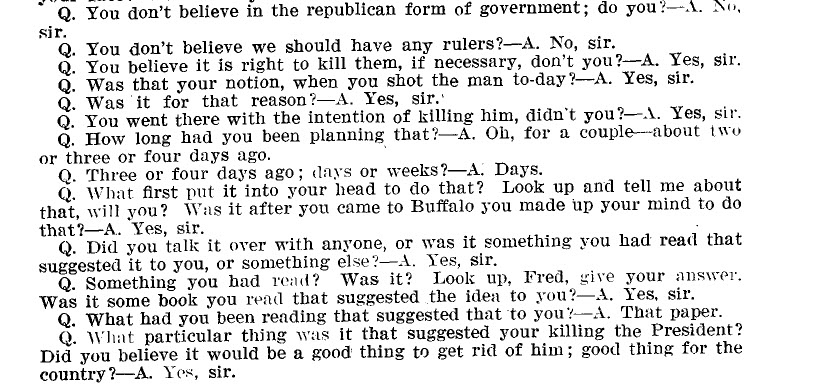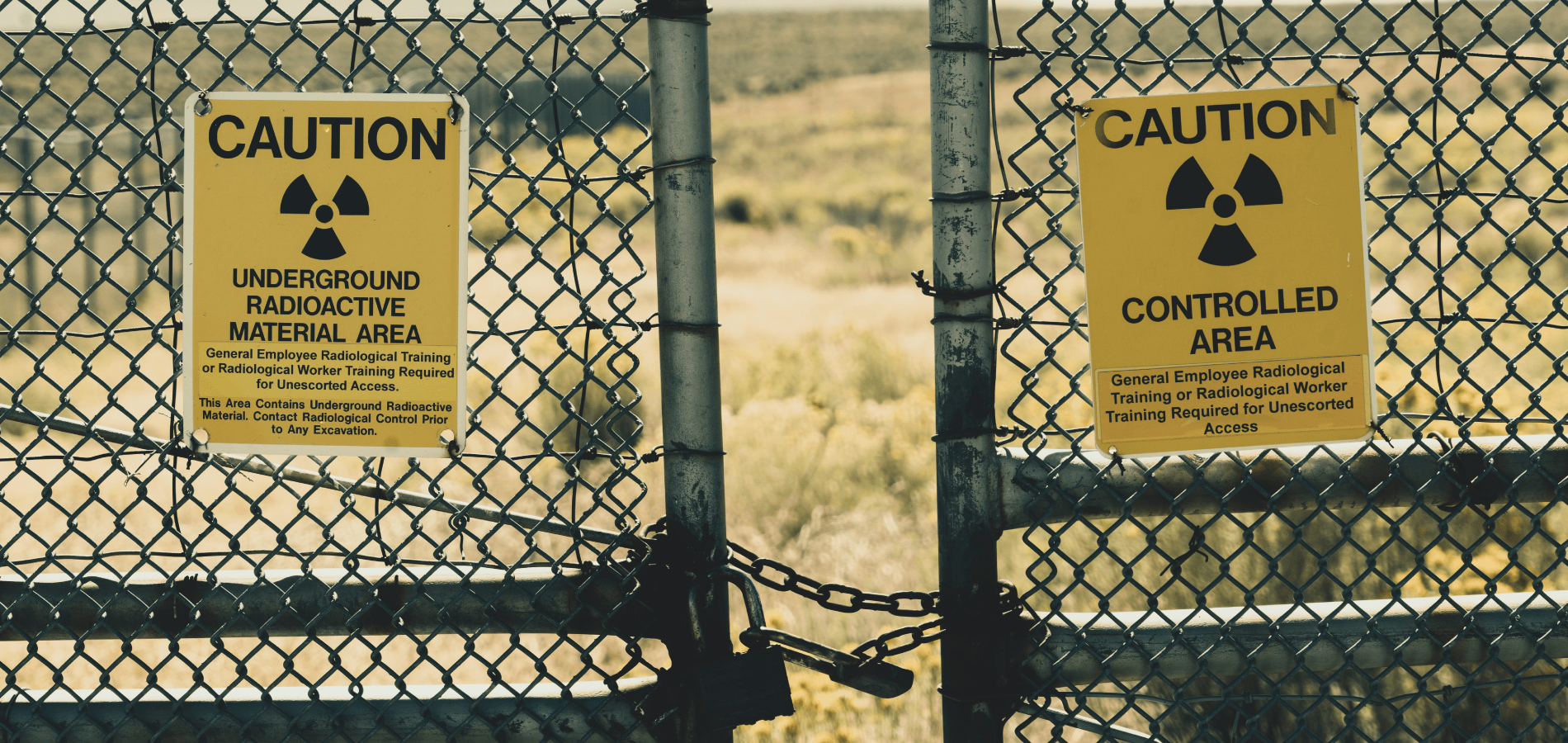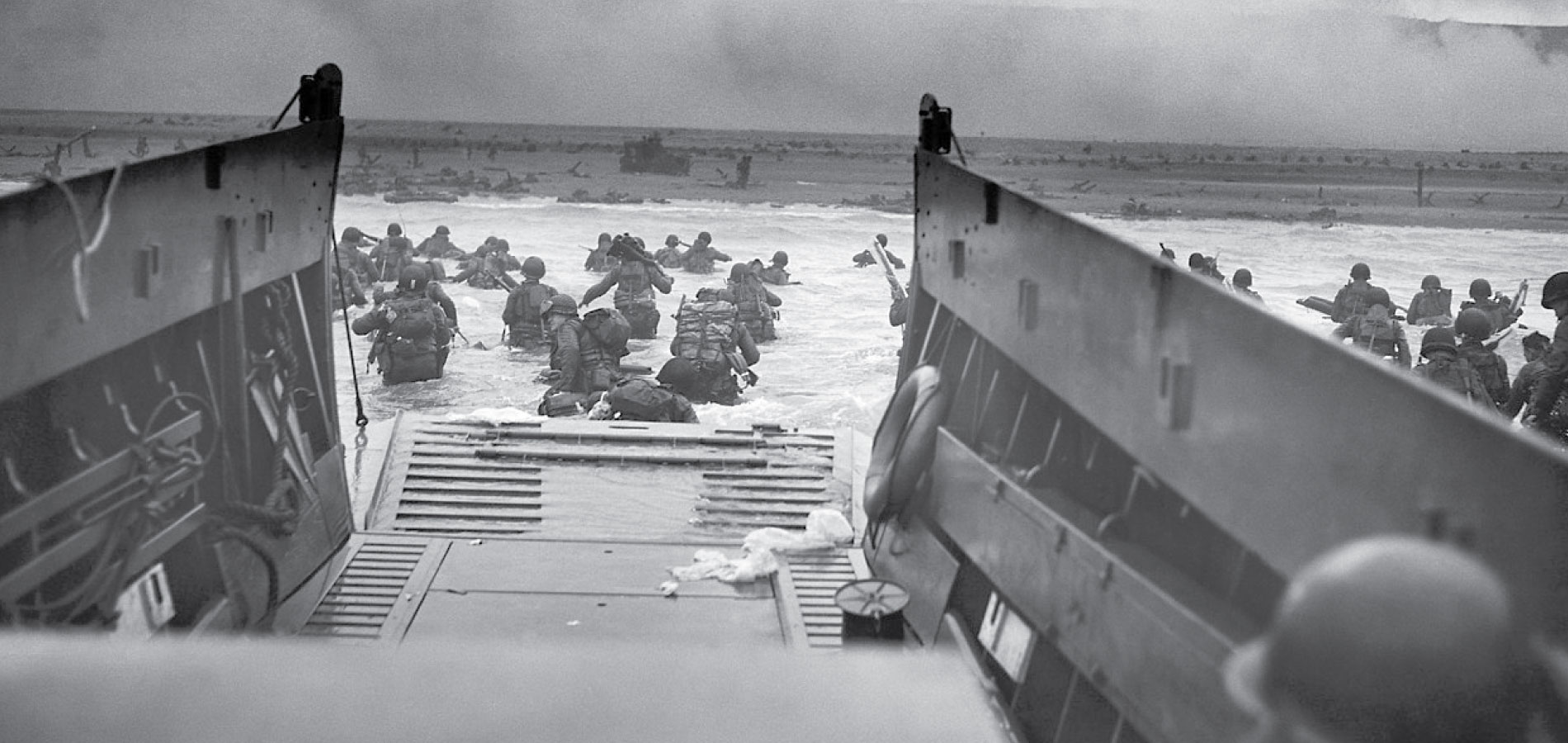It was none other than HeinOnline’s hometown of Buffalo, New York, where the third assassination of an American president took place on September 6, 1901. President McKinley, visiting Buffalo for the Pan-American Exposition, was shot by an anarchist and died several days later due to complications. In this month’s edition of Secrets of the Serial Set, we dive into this essential resource to explore what happened during those fateful days that led to William McKinley’s assassination and Theodore Roosevelt, McKinley’s vice president, taking the oath of office.
McKinley’s Tour
At the time of the assassination, McKinley was about half a year into his second term and was a wildly popular president, having just led the nation to victory in the Spanish-American War, which led to the annexation of Puerto Rico[1]“Hearings on bill to provide government for Puerto Rico.” U.S. Congressional Serial Set, , 1899, pp. 1-226. HeinOnline, https://heinonline.org/HOL/P?h=hein.usccsset/usconset31226&i=683. This document can be found in … Continue reading and the Philippines.[2]“Articles by Wilcox, Sargent, etc., relating to Philippine Islands.” U.S. Congressional Serial Set, , 1899, pp. 1-52. HeinOnline, https://heinonline.org/HOL/P?h=hein.usccsset/usconset31225&i=1. This document can be … Continue reading He had planned for a tour of the country to promote the Dingley Tariff, which was designed to establish trade agreements with other countries that would allow for U.S. manufacturers to expand sales globally. The tour was scheduled to end in Buffalo on President’s Day—however, McKinley’s wife, Ida, fell ill early into the tour and it was cancelled. McKinley’s speech at the Pan-American Exposition[3]“To encourage Pan-American Exposition, 1901.” U.S. Congressional Serial Set, , 1898, pp. 1-4. HeinOnline, https://heinonline.org/HOL/P?h=hein.usccsset/usconset32675&i=531. This document can be found in … Continue reading was then rescheduled to September 5.
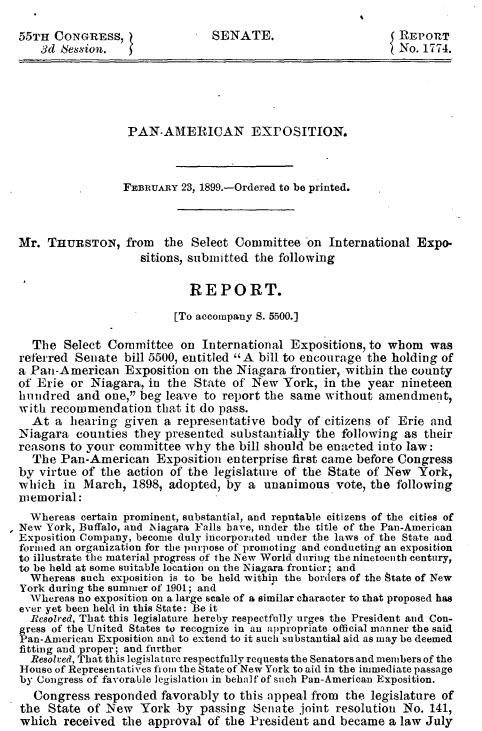
Meanwhile, Leon Czolgosz, born in Detroit and of Polish descent, had lost his job during the Panic of 1893[4]“Independent Treasury of U.S. and its relations to banks of country.” U.S. Congressional Serial Set, , 1909, pp. 1-370. HeinOnline, https://heinonline.org/HOL/P?h=hein.usccsset/usconset25560&i=255. This document can be found in … Continue reading and subsequently became an anarchist. Czolgosz moved to Buffalo ahead of McKinley’s visit, and would later tell police, “It was in my heart, there was no escape for me. I could not have conquered it had my life been at stake. There were thousands of people in town on Tuesday. I heard it was President’s Day. All those people seemed bowing to the great ruler. I made up my mind to kill that ruler.”[5]Alexander K.; Morris McClure, Charles. Authentic Life of William McKinley, Our Third Martyr President: Together with a Life Sketch of Theodore Roosevelt, the 26th President of the United States (1901). This document can be found in … Continue reading He purchased a .32-caliber Iver Johnson revolver in preparation.
Day 1: The Speech
McKinley was scheduled for two days of events in Buffalo. On Thursday, September 5, he was to deliver his speech and tour the Pan-American exposition. The crowd for McKinley’s speech[6]“Last speech of William McKinley.” U.S. Congressional Serial Set, , 1903, pp. 1-12. HeinOnline, https://heinonline.org/HOL/P?h=hein.usccsset/usconset30392&i=501. This speech can be found in HeinOnline’s U.S. … Continue reading grew to a record-breaking 116,000 people. During the speech, McKinley encouraged the end of isolationism, aspiring to expand global trade. The speech was met with thunderous applause. Czolgosz was in the crowd that day, and positioned himself close to the podium, but he was nervous about missing his target, and so he didn’t shoot. After the speech, McKinley went on a tour of the fair, enjoyed a luncheon at the New York State Building, and attended a reception at the Government Building. There was even a fireworks display that night that culminated in a pyrotechnic display of the words “Welcome President McKinley, Chief of our Nation and Our Empire.”
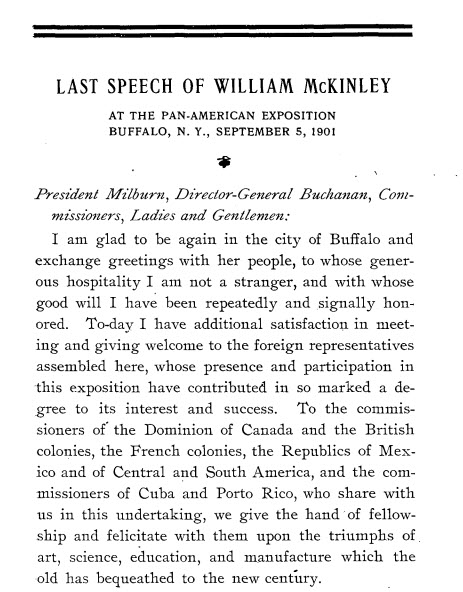
Day 2: Niagara Falls, and the Fall of the President
The following day, September 6, the McKinleys traveled up to Niagara Falls for a tour. Then, they returned to Buffalo, where McKinley was scheduled to meet with the public at the Temple of Music,[7]“Vice Presidents of the United States, 1789-1993.” Congressional Serial Set, , 1996, pp. 1-619. HeinOnline, https://heinonline.org/HOL/P?h=hein.usccsset/usconset51421&i=328. This document can be found in HeinOnline’s U.S. … Continue reading a venue constructed for the Exposition. Ida McKinley wasn’t feeling well, so she returned to the Milburn House, where the McKinleys were staying with the Exposition’s president, John G. Milburn. McKinley’s personal secretary, George B. Cortelyou, had tried twice to remove the Temple of Music event from McKinley’s schedule, fearing for his safety. However, McKinley insisted on it, as he greatly enjoyed meeting directly with the people. For safety, Cortelyou called in backup, including extra police, detectives, soldiers, and Secret Service agents to guard the venue.
As an organist struck up a Bach sonata, a procession of people lined up to shake McKinley’s hand. Czolgosz joined the line. He had wrapped up his right hand in a bandage to conceal his revolver. As he approached McKinley, who reached to shake his hand, Czolgosz shot him twice. The first bullet bounced off a button and only grazed the president, but the second bullet lodged into his stomach.[8]“Vice Presidents of the United States, 1789-1993.” Congressional Serial Set, , 1996, pp. 1-619. HeinOnline, https://heinonline.org/HOL/P?h=hein.usccsset/usconset51421&i=328. This document can be found in … Continue reading
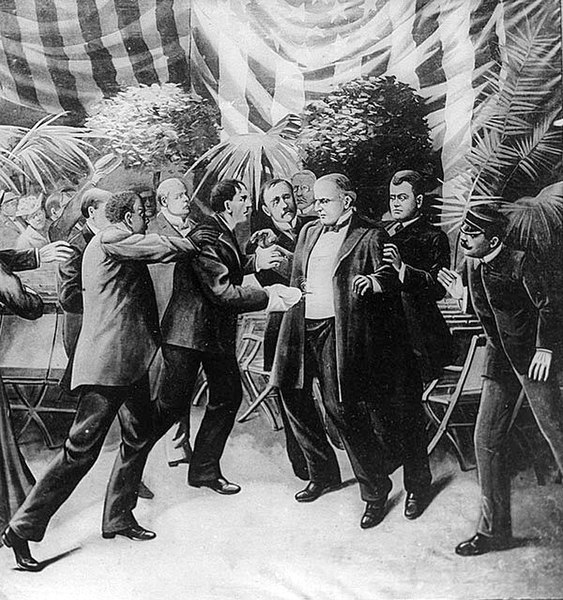
As the New York Times would later write, “There was an instant of almost complete silence, like the hush that follows a clap of thunder…The President stood stock still, a look of hesitancy, almost of bewilderment, on his face. Then he retreated a step while a pallor began to steal over his features. The multitude seemed only partially aware that something serious had happened…”[9]Alexander K.; Morris McClure, Charles. Authentic Life of William McKinley, Our Third Martyr President: Together with a Life Sketch of Theodore Roosevelt, the 26th President of the United States (1901). This document can be found in … Continue reading
Before Czolgosz could fire any additional bullets, James “Big Jim” Parker, who had also been standing in line, punched him and prevented him from doing so. Guards then proceeded to beat up Czolgosz while McKinley was taken to a chair. He didn’t think that he was seriously injured, but he did say to Cortelyou, of his wife, “Be careful how you tell her—oh, be careful!”[10]110 Cong. Rec. 1373 (1964). This Congressional Record can be found in HeinOnline’s U.S. Congressional Documents database. He also ordered for the beating of Czolgosz to cease. Czolgosz was dragged away to the Buffalo police headquarters,[11]Investigation activities of Justice Department, Investigation Activities of the Department of Justice. Letter from the Attorney General Transmitting in Response to a Senate Resolution of October 17, 1919, a Report on the Activities of the Bureau of … Continue reading where a large crowd would grow that night. McKinley was then taken to the Exposition hospital.

The Botched Surgery
The Exposition hospital did have an operating theatre, but the only physician available at the time was a gynecologist. The city’s leading surgeon at the time, Roswell Park, was in Niagara Falls performing a neck surgery and wasn’t able to attend to McKinley. At the time, it was not common for abdominal bullet wounds to be successfully treated. The hospital was lacking basic equipment, and because the president was rather large, the surgeon had a difficult time finding the bullet—he assumed that it was somewhere in the president’s back, but it was never located. Instead, the surgeon closed up the stomach wounds and provided the president with pain relief, and he was brought back to the Milburn House.
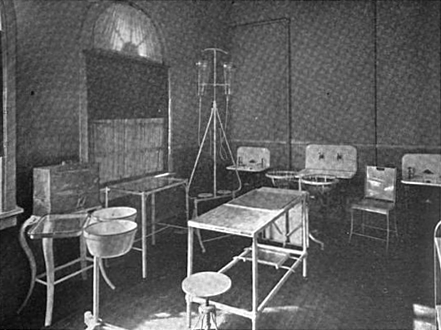
While the news of the assassination attempt spread around the world via telegraph, it seemed that McKinley was on the mend. In fact, in the subsequent days, he seemed to be in such good spirits that his vice president, Theodore Roosevelt, who had traveled to Buffalo following the shooting, decided to go on a camping trip in the Adirondacks.[12]“Vice Presidents of the United States, 1789-1993.” Congressional Serial Set, , 1996, pp. 1-619. HeinOnline, https://heinonline.org/HOL/P?h=hein.usccsset/usconset51421&i=328. This document can be found in … Continue reading He told reporters, “You may say that I am absolutely sure the president will recover.”
However, on September 13, McKinley collapsed. Gangrene was spreading along the walls of his stomach. He died at 2:15 a.m. on Saturday, September 14, with his wife Ida by his side.
The Aftermath
Theodore Roosevelt was rushed back to Buffalo, where he took the oath of office around 3 p.m. on September 14, at the Ansley Wilcox House.[13]“Acquisition, etc., of Ansley Wilcox House in Buffalo, N.Y., as national historic site.” U.S. Congressional Serial Set, , 1963, pp. 1-4. HeinOnline, https://heinonline.org/HOL/P?h=hein.usccsset/usconset22427&i=1219. This document … Continue reading During an autopsy, it was found that the bullet had passed through and damaged several of McKinley’s organs, and scholars today believe that he died of pancreatic necrosis, which even today is difficult to treat, and in 1901 would have been nearly impossible. McKinley’s body was moved to Buffalo City and County Hall for national mourning, and it was then taken to Washington and finally to his home of Canton, Ohio. When his body was brought from his home for the funeral, all activity in the nation was halted for five minutes to honor the fallen president.
Meanwhile, Czolgosz went on trial in a state court in Buffalo on September 23, 1901. In the moments before his sentencing, he stated, “I killed the president for the good of the laboring people, the good people. I am not sorry for my crime.”

Unsurprisingly, the jury quickly convicted Czolgosz, and he was sentenced to death and executed by electric chair on October 29 of that year. The assassination sparked a nationwide distrust of anarchists. Emma Goldman, a prominent anarchist and activist at the time, was arrested, as Czolgosz cited her as an influence, although she was eventually released.
Additionally, there was widespread criticism of the lack of protection of McKinley at the Exposition. In 1906, Congress passed the Sundry Civil Expenses Act that officially established the Secret Service as in charge of protecting the president.
Continue Your Research by Diving into the Serial Set
The U.S. Congressional Serial Set database is provided at no additional cost to all Core+ subscribers. We welcome you to explore this uniquely designed database to unearth all of the hidden stories within U.S. history—you never know what you might discover.
HeinOnline Sources[+]
| ↑1 | “Hearings on bill to provide government for Puerto Rico.” U.S. Congressional Serial Set, , 1899, pp. 1-226. HeinOnline, https://heinonline.org/HOL/P?h=hein.usccsset/usconset31226&i=683. This document can be found in HeinOnline’s U.S. Congressional Serial Set. |
|---|---|
| ↑2 | “Articles by Wilcox, Sargent, etc., relating to Philippine Islands.” U.S. Congressional Serial Set, , 1899, pp. 1-52. HeinOnline, https://heinonline.org/HOL/P?h=hein.usccsset/usconset31225&i=1. This document can be found in HeinOnline’s U.S. Congressional Serial Set. |
| ↑3 | “To encourage Pan-American Exposition, 1901.” U.S. Congressional Serial Set, , 1898, pp. 1-4. HeinOnline, https://heinonline.org/HOL/P?h=hein.usccsset/usconset32675&i=531. This document can be found in HeinOnline’s U.S. Congressional Serial Set. |
| ↑4 | “Independent Treasury of U.S. and its relations to banks of country.” U.S. Congressional Serial Set, , 1909, pp. 1-370. HeinOnline, https://heinonline.org/HOL/P?h=hein.usccsset/usconset25560&i=255. This document can be found in HeinOnline’s U.S. Congressional Serial Set. |
| ↑5 | Alexander K.; Morris McClure, Charles. Authentic Life of William McKinley, Our Third Martyr President: Together with a Life Sketch of Theodore Roosevelt, the 26th President of the United States (1901). This document can be found in HeinOnline’s U.S Presidential Library. |
| ↑6 | “Last speech of William McKinley.” U.S. Congressional Serial Set, , 1903, pp. 1-12. HeinOnline, https://heinonline.org/HOL/P?h=hein.usccsset/usconset30392&i=501. This speech can be found in HeinOnline’s U.S. Congressional Serial Set. |
| ↑7 | “Vice Presidents of the United States, 1789-1993.” Congressional Serial Set, , 1996, pp. 1-619. HeinOnline, https://heinonline.org/HOL/P?h=hein.usccsset/usconset51421&i=328. This document can be found in HeinOnline’s U.S. Congressional Serial Set. |
| ↑8, ↑12 | “Vice Presidents of the United States, 1789-1993.” Congressional Serial Set, , 1996, pp. 1-619. HeinOnline, https://heinonline.org/HOL/P?h=hein.usccsset/usconset51421&i=328. This document can be found in HeinOnline’s U.S. Congressional Serial Set. |
| ↑9 | Alexander K.; Morris McClure, Charles. Authentic Life of William McKinley, Our Third Martyr President: Together with a Life Sketch of Theodore Roosevelt, the 26th President of the United States (1901). This document can be found in HeinOnline’s U.S Presidential Library. |
| ↑10 | 110 Cong. Rec. 1373 (1964). This Congressional Record can be found in HeinOnline’s U.S. Congressional Documents database. |
| ↑11 | Investigation activities of Justice Department, Investigation Activities of the Department of Justice. Letter from the Attorney General Transmitting in Response to a Senate Resolution of October 17, 1919, a Report on the Activities of the Bureau of Investigation of the Department of Justice [i] (1919). This document can be found in HeinOnline’s U.S. Congressional Serial Set. |
| ↑13 | “Acquisition, etc., of Ansley Wilcox House in Buffalo, N.Y., as national historic site.” U.S. Congressional Serial Set, , 1963, pp. 1-4. HeinOnline, https://heinonline.org/HOL/P?h=hein.usccsset/usconset22427&i=1219. This document can be found in HeinOnline’s U.S. Congressional Serial Set. |

